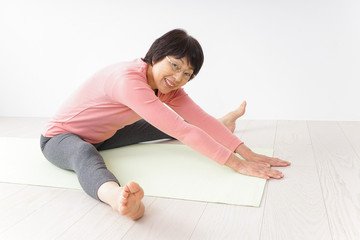The word “Menopause” brings up different feelings in different people and cultures, but what is menopause? Menopause is something that all women go through. It is the time in life when a monthly cycle comes to an end.
On average menopause happens naturally after a woman reaches her mid 40s to early 50s. A woman stops having periods at this time because her ovaries stop producing the hormones needed for menopause and pregnancy to occur, primarily progesterone and estrogen.
When a woman’s body is starting to change from a childbearing body to a menopausal body, the transitional phase is termed perimenopause, which translates out to be “around menopause.” Once a woman has gone a full year without having a period, menopause has completed.
The transition, mentally, seems to be less of an issue in the Western world than the discomforts that women suffer while the change is occurring. Menopause treatment has become a big business, and there are many therapies on the market to help with the symptoms some women suffer from. But there are also many ways to provide natural menopause relief.
Do All Women Suffer?

Though all women go through menopause, research has shown that not all women suffer the discomforts of menopause that seem to be prevalent in the western world. Not only that, but in other areas of the world, menopause is looked forward to rather than seen as a negative change.
When women in the United States think and talk about menopause, two of the biggest things that pervade their minds are hot flashes and night sweats. It would be a surprise to them if they were to find out that these symptoms are not shared around the world, different cultures speak of varying degrees of discomfort.
During studies on menopause, that started in the 1970’s, it was noted that hundreds of women studied in India had no complaints of perimenopause discomfort. In Japan, shoulder stiffness was the main complaint. When it came to degrees of complaints, most complaints were said to be mild.
So why do the western countries seem to suffer so much more during the time when their bodies are changing? Could our lifestyle choices be the reason for our varying degrees of menopausal symptom complaints? Is menopause treatment vital?
Before we talk more about the lifestyle, let’s look at some of the common complaints of menopausal symptoms in the United States.
Symptoms of Menopause

Though hot flashes and night sweats are the most talked about menopause symptoms, below are a few more that are quite common in the United States:
- Mood swings
- Increased facial hair
- Disturbed sleep
- Vaginal dryness
- Thinning hair on the head
These symptoms, though quite bothersome, are not life-threatening, which is good to know, right?
If your doctor is recommending conventional, medical treatment, it is essential to know if you are at risk for breast cancer, cardiac disease or osteoporosis. Why? Let’s look at some of the risks of medical treatment of menopause symptoms.

As with most medical treatments for other diseases, conventional menopause treatment is geared at relieving the symptoms the woman is having. These treatments can include:
- Antidepressants for mood swings
- Vaginal lubricants or estrogen therapy for vaginal dryness
- Estrogen Replacement to decrease hot flashes and improve sleep, as well as reducing the risk of osteoporosis, a controversial topic at best due to the possibility of increasing the risk of cardiac disease
It is a good thing that women at least have some choices to help them get through menopause if their suffering is decreasing their quality of life. But what if lifestyle changes were taught and implemented ahead of time or even during menopause? What if lifestyle choices negated the need for menopause treatment for some?
Natural Menopause Relief
Lifestyle Choices Can Help Decrease Menopausal Discomfort

Changing your lifestyle is all about protecting yourself from the things that “can” happen. It is documented that menopause can cause weakened bones due to the decreased amount of estrogen in the body. But there are changes that can be made to lessen the risk of osteoporosis:
- Increasing your exercise to at least three days per week
- Changing your diet to one with increased calcium, vitamin D and Fiber
- Working to get to and maintain a healthy weight
- Stop smoking, which is a documented risk factor for osteoporosis.
- Include weight bearing activities into your exercise routine
- Flamingo stand – stand on one leg for 2 minutes and switch to the other leg. Repeat 2x per day. Use a counter-top for balance. This can help improve or maintain bone density in the hips.
Holistic and Integrative Menopause Treatments
When treating menopause holistically, it is crucial to purvey the idea that menopause is not an illness. Taking the mind to a place of acceptance of this reality can, in itself, help decrease the discomforts of menopause by looking at them for what they are.
The aim of integrative therapies, for menopausal discomforts, is similar to conventional therapies: to ease the discomfort of the symptoms. Surveys have shown that women are already using these treatments to provide natural menopause relief, and are finding them useful.
The integrative approach, however, is not about masking the symptoms, but about looking at the woman as a whole and seeing what lifestyle changes can be made so that her body will balance out which will cause the discomforts to disappear.
Integrative changes aren’t just about the body, but work on the mind, the emotions and the spiritual balances as well. Integrative therapy looks at the whole woman and helps her balance out all aspects of her life. This is not just good for providing natural menopause relief, but also for increasing optimal wellness in all areas of health.
Using the Mind and Body vs. Hormones and Medications

There are two significant perks when considering lifestyle changes vs. conventional treatments. Money and the Risk factor for further diseases.
Multiple studies have shown the positive results of diet, exercise, relaxation and stress management to increasing one’s overall health. This is no less true than with the discomforts of menopause and probably much more welcome.
The above-mentioned changes may not be the magic pill for your menopause symptoms; however they will improve the overall quality of your life.
When the menopausal transformation is complete, you will have new lifestyle that could give you a new perspective on freedom. And a better appreciation for health than you ever have.
Whether you are looking for information for yourself or someone you love, this may be the time to try something new. Balanced Care is about helping you be balanced on all levels. Call us and find out what Balanced Care can help you do for you.

